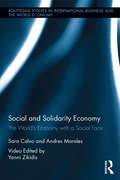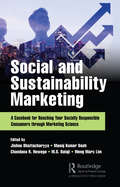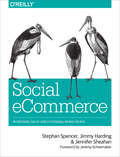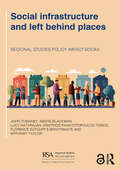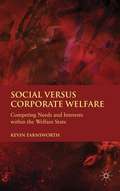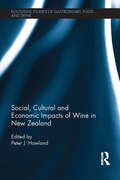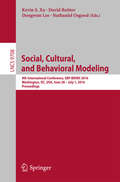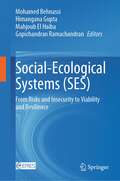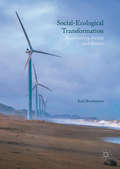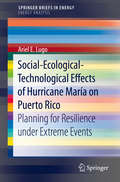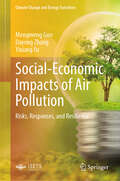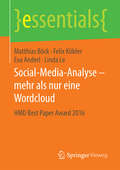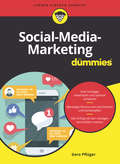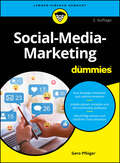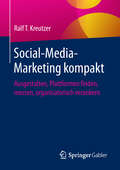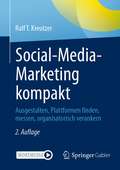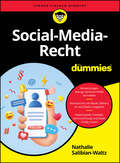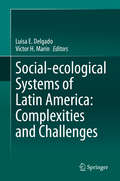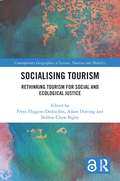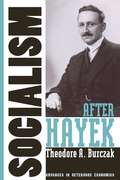- Table View
- List View
Social and Solidarity Economy: The World’s Economy with a Social Face (Routledge Studies in International Business and the World Economy)
by Sara Calvo Andres Morales Yanni ZikidisThis book aims to provide the reader with an insight into the relevance of a section of the economy, which is often referred to as the ‘social and solidarity economy’ (SSE); and highlight some of the current issues in the field, how they are being addressed and some of their future implications. Using case studies from around the world, this book ‘Social and Solidarity Economy: The World’s Economy With a Social Face’ provides an up-to-date account of the strengths and weaknesses of these initiatives across four continents including issues that have not been researched sufficiently before (e.g. circular economy, social propaganda and its dangers, social enterprise as a panacea for NGOs in developing countries, and ‘new’ social movements). There is growing interest in SSE initiatives among policymakers, foundations, researchers and academic institutions around the world. Despite this interest, SSE related research remains scarce. There are concerned that SSE initiatives, which contribute significantly to their local communities’ development, need to be more widely disseminated amongst the general public. The Social and Solidarity Economy: The World’s Economy With a Social Face will help promote the ground-breaking work being done by organisations and individuals but which remain undocumented and help to raise awareness of such initiatives as well as contribute to academia with a critical approach to the sector covering issues that have not been covered much before, such as the circular economy and the dangers of social propaganda. Aimed at researchers, academics and policy makers in the fields of Social Enterprise, CSR, Tourism, International Economics as well as supporting disciplines ‘Social and Solidarity Economy: The World’s Economy With a Social Face’ looks to establish and help define the field.
Social and Sustainability Marketing: A Casebook for Reaching Your Socially Responsible Consumers through Marketing Science
by Manoj Kumar Dash Weng Marc Lim Jishnu Bhattacharyya Chandana Hewege M.S. Balaji"... an important intervention in the conversation around social and ecological sustainability that draws on both micromarketing and macromarketing scholarship to help the reader understand the challenges with illustrations from insightful cases both from emerging and developed economies. This compilation should be essential reading for the discerning student of sustainable consumption and production." -- Professor Pierre McDonagh, Associate Editor, Journal of Macromarketing (USA); Professor of Critical Marketing & Society, University of Bath, UK Experts in the field of economics, management science, and particularly in the marketing domain have always been interested in and acknowledged the importance of sustaining profitable businesses while incorporating societal and environmental concerns; however, the level of existing literature and availability of teaching cases reflect a dearth of real case studies, especially those focused on marketing for social good. This book of actual case studies will address that need. In addition, this book is important and timely in providing a case book for instructors (those in both industry and academia) to help them in teaching and training the next generation of leaders through corporate training and universities. Currently, marketing for social good is increasingly becoming a part of most curriculums under the umbrella of different titles, such as social marketing, green marketing, and sustainability marketing. The relevance of these studies is increasing across the globe. This book is composed of long and short real cases with varying complexity in different sectors. This case book will also cover some review articles for an overview of the recent developments in the study area. With these case studies, collections of questions, teaching materials, and real-life marketing scenarios, this book offers a unique source of knowledge to marketing professionals, students, and educators across the world. The main objective of this case book is to understand the applicability of marketing science (marketing for social good context, such as social marketing and sustainability marketing) in internet marketing related to e-buying behavior and e-WOM. In addition, it illustrates the various types of existing marketing practices that are relevant from both theoretical and practical points of view in this electronic era, as well as discussing other non-electronic marketing practices and focusing on consumer buying behavior. As a result, marketing managers can treat their customers according to their desired value. This book particularly explores the possibilities and advantages created by social marketing and sustainability marketing through the presentation of thorough review articles and case studies. This case book helps corporate training centers and universities with compact teaching reference materials in their relevant courses.
Social eCommerce
by Stephan Spencer Jennifer Sheahan Jimmy HardingWant to make money online? Then ignore social media at your own risk. Social media is vital if you want to your business to thrive, and though you can't control the conversations, you can influence them. This book will teach you how.If mismanaged, social media can create more noise than signal. It can be a time and energy suck--for you and your audience. Or worse still, it can become an echo chamber for negative PR.If done well, guerrilla social media marketing can help you persuade, command attention, establish dialogue, differentiate yourself, capture new markets, and outmaneuver the competition--all on a shoestring budget. Whether you're selling digital goods and services, physical goods, or local services, this book has the answers.Strategize and optimize your social presence in ways you didn't know were possibleDrive more clicks and sales with better-performing Facebook adsDevelop remarkable content with viral potentialManage your online reputation, instead of letting it manage youIntegrate social media into your SEO strategy, and vice versaLeverage online influencers to promote your brand, and become an influencer yourself
Social eCommerce: Increasing Sales and Extending Brand Reach
by Stephan Spencer Jennifer Sheahan Jimmy HardingWant to make money online? Then ignore social media at your own risk. Social media is vital if you want to your business to thrive, and though you can’t control the conversations, you can influence them. This book will teach you how.If mismanaged, social media can create more noise than signal. It can be a time and energy suck—for you and your audience. Or worse still, it can become an echo chamber for negative PR.If done well, guerrilla social media marketing can help you persuade, command attention, establish dialogue, differentiate yourself, capture new markets, and outmaneuver the competition—all on a shoestring budget. Whether you’re selling digital goods and services, physical goods, or local services, this book has the answers.Strategize and optimize your social presence in ways you didn’t know were possibleDrive more clicks and sales with better-performing Facebook adsDevelop remarkable content with viral potentialManage your online reputation, instead of letting it manage youIntegrate social media into your SEO strategy, and vice versaLeverage online influencers to promote your brand, and become an influencer yourself
Social infrastructure and left behind places (Regional Studies Policy Impact Books)
by John Tomaney Lucy Natarajan Florence Sutcliffe-Braithwaite Maeve Blackman Dimitrios Panayotopoulos-Tsiros Myfanwy TaylorThis book explores the making, unmaking and remaking of social infrastructure in ‘left-behind places’. Such places, typically once flourishing industrial communities that have been excluded from recent economic growth, now attract academic and policy attention as sites of a political backlash against globalisation and liberal democracy. The book focuses on the role of social infrastructure as a key component of this story. Seeking to move beyond a narrowly economistic of reading ‘left behind places’, the book addresses the understudied affective dimensions of ‘left-behindness’. It develops an analytical framework that emphasises the importance of place attachments and the consequences of their disruption; considers ‘left behind places’ as ‘moral communities’ and the making of social infrastructure as an expression of this; views the unmaking of social infrastructure through the lens of ‘root shock’; and explains efforts at remaking it in terms of the articulation of ‘radical hope’. The analysis builds upon a case study of a former mining community in County Durham, North East England. Using mixed methods, it offers a ‘deep place study’ of a single village to understand more fully the making, unmaking and remaking of social infrastructure. It shows how a place once richly endowed with social infrastructure, saw this endowment wither and the effects this had on the community. However, it also records efforts of the local people to rebuild social infrastructure, typically drawing the lessons of the past. Although the story of one village, the methods, results and policy recommendation have much wider applicability. The book will be of interest to researchers, policy makers and others concerned with the fate of ‘left behind places’.
Social infrastructure and left behind places (Regional Studies Policy Impact Books)
by John Tomaney Lucy Natarajan Florence Sutcliffe-Braithwaite Maeve Blackman Dimitrios Panayotopoulos-Tsiros Myfanwy TaylorThis book explores the making, unmaking and remaking of social infrastructure in ‘left-behind places’. Such places, typically once flourishing industrial communities that have been excluded from recent economic growth, now attract academic and policy attention as sites of a political backlash against globalisation and liberal democracy. The book focuses on the role of social infrastructure as a key component of this story.Seeking to move beyond a narrowly economistic of reading ‘left behind places’, the book addresses the understudied affective dimensions of ‘left-behindness’. It develops an analytical framework that emphasises the importance of place attachments and the consequences of their disruption; considers ‘left behind places’ as ‘moral communities’ and the making of social infrastructure as an expression of this; views the unmaking of social infrastructure through the lens of ‘root shock’; and explains efforts at remaking it in terms of the articulation of ‘radical hope’.The analysis builds upon a case study of a former mining community in County Durham, North East England. Using mixed methods, it offers a ‘deep place study’ of a single village to understand more fully the making, unmaking and remaking of social infrastructure. It shows how a place once richly endowed with social infrastructure, saw this endowment wither and the effects this had on the community. However, it also records efforts of the local people to rebuild social infrastructure, typically drawing the lessons of the past. Although the story of one village, the methods, results and policy recommendation have much wider applicability.The book will be of interest to researchers, policy makers and others concerned with the fate of ‘left behind places’.The Open Access version of this book, available at http://www.taylorfrancis.com, has been made available under a Creative Commons Attribution-Non Commercial (CC-BY-NC) 4.0 license.
Social versus Corporate Welfare
by Kevin FarnsworthThe greatest myth of modern times is the suggestion that capitalism and corporations do better with less government. The global economic crisis has certainly put paid to this idea. But the massive emergency state bailouts and interventions put in place from 2008 were unique only in their size and scale. Government programmes, designed to meet the needs of business, are not just everyday, they are everywhere and they are essential. Just as social welfare protects citizens from the cradle to the grave, corporate welfare protects and benefits corporations throughout their life course. And yet, in most countries, corporate welfare is hidden and underresearched. Drawing on comparative data from OECD states, this book seeks to shed light on the size, uses and importance of corporate welfareacross variouswelfare regimes.
Social, Cultural and Economic Impacts of Wine in New Zealand. (Routledge Studies of Gastronomy, Food and Drink)
by Peter J. HowlandNew Zealand’s wine came to the world’s attention in the late 1980’s with its production of some of the best quality sauvignon blancs. Since then the industry has grown significantly and has increasingly gained an international reputation as a producer of quality, boutique wines.This volume provides an innovative, multi-disciplinary and critical review of wine production and consumption focusing specifically on the fascinating wine industry of New Zealand. It considers the history, production, aesthetics, consumption and role of place (identity) from multi-disciplinary perspectives to offer insight into the impacts of wine production and consumption. By linking the study of wine to broadly constructed social, cultural, historical and transnational processes the book contributes to contemporary debates on the “life of commodities”, “social class” and “place and people”. Throughout comparisons are made to other internationally recognized wine regions such as Bordeaux and Burgundy.This title furthers the understanding of the social/cultural context of wine production and consumption in this region and will be valuable reading to students, researchers and academics interested in gastronomy, wine studies, tourism and hospitality.
Social, Cultural, and Behavioral Modeling: 9th International Conference, SBP-BRiMS 2016, Washington, DC, USA, June 28 - July 1, 2016, Proceedings (Lecture Notes in Computer Science #9708)
by Kevin S. Xu, David Reitter, Dongwon Lee and Nathaniel OsgoodThis book constitutes the refereed proceedings of the 9th International Conference on Social, Cultural, and Behavioral Modeling & Prediction and Behavior Representation in Modeling and Simulation, SBP-BRiMS 2016, held in Washington, DC, USA, in June/July 2016. The 38 full papers presented were carefully reviewed and selected from 78 submissions. The goal of this conference was to build a new community of social cyber scholars by bringing together and fostering interaction between members of the scientific, corporate, government and military communities interested in understanding, forecasting and impacting human socio-cultural behavior. For this three challenges have to be met: deep understanding, socio-cognitive reasoning, and re-usable computational technology. Thus papers come from a wide number of disciplines: computer science, psychology, sociology, communication science, public health, bioinformatics, political science, and organizational science.
Social-Ecological Systems (SES): From Risks and Insecurity to Viability and Resilience
by Mohamed Behnassi Gopichandran Ramachandran Himangana Gupta Mahjoub El HaibaThis book contributes to the multidisciplinary debate about social–ecological systems (SES) within the perspective of rethinking the nature of interaction between these systems, especially in the Anthropocene Era. Most chapters either deliberate on risk dynamics threatening current SES or stimulate thought processes to manage such risks and related negative implications. After analyzing the main drivers of SES vulnerability, the book highlights the shifts to be made to enhance the sustainability and resilience of these systems, mainly the integration and restructuring of governance frameworks, the reorganization of production and consumption systems far from conventional models based on consumerism, the elaboration of mitigation, adaptation, and SDGs implementation measures from a co-benefit perspective, and the consideration of appropriate approaches and paradigms while elaborating and implementing response mechanisms. This volume is relevant to researchers/experts, students, practitioners, and decision-makers from different scales and spheres.
Social-Ecological Transformation
by Karl BruckmeierThis book advances a social-ecological theory to reconnect nature and society through sustainable transformation of interacting social and ecological systems. Social ecology develops as an interdisciplinary science by using knowledge from the social sciences, especially sociology and economics, and from natural-scientific ecology. Knowledge integration across the boundaries of social and natural sciences is not widespread, blocked by the specialisation of theories and their competing forms of explanation and interpretation. Chapters in this book describe a new social-ecological theory that connects concepts and theories from both sides to create a new interdisciplinary theory. Inter- and transdisciplinary knowledge synthesis creates possibilities to analyse global environmental problems more systematically by integrating specialized research on environmental problems. The author uses social-ecological theory to analyse and explain problems and processes of global change in modern society such as climate change and adaptation to it, ecosystem change, and transformation of the industrial energy regime , finally offering pathways of transformation to a future sustainable society.
Social-Ecological-Technological Effects of Hurricane María on Puerto Rico: Planning for Resilience under Extreme Events (SpringerBriefs in Energy)
by Ariel E. LugoThis book deals with the immediate effects of, and response to, Hurricane María on the social, ecological, and technological systems (SETS) of Puerto Rico. The SETS approach to analyzing hurricane effects places into historical context the role of social and technological factors, and compares social and ecological resilience on the same temporal scales. Written from the perspective of a Puerto Rican scientist who experienced Maria's wrath first-hand, the book uses extensive empirical knowledge of the ecological effects of hurricanes on Caribbean forests and combines that knowledge with a detailed analysis of the effects of Hurricane María on the social and technological fabric of Puerto Rico.The comparison suggests that the effects of extreme events are dictated not only by the strength of the physical event, but also by the conditions of affected SETS at the time when the event exerts influence over them. Moreover, SETS have historical legacies that influence how resilient they can be when affected by an extreme event. Therefore, preparation and response to extreme events require an integrated social, ecological, and technological effort, known as the SETS response. The SETS response requires an understanding of the energetics of extreme events and their effects on the economy, which in turn determines social and technological resilience. Hurricane María demonstrated that the social and technological systems of Puerto Rico were not adapted to dealing with extreme events, in contrast with the ecological systems, which were. Hurricane María’s effect on Puerto Rico can be used as an example from which valuable lessons emerge for making SETS more adaptable and resilient to extreme events.
Social-Economic Impacts of Air Pollution: Risks, Responses, and Resilience (Climate Change and Energy Transition)
by Dayong Zhang Mengmeng Guo Yixiang YuThis book examines the social and economic impacts of air pollution, a major environmental threat causing extensive attention in the recent years. It explores how air pollution affects stock market performance, investor behavior, and the financial health of industries like tourism and health insurance; It examines how air quality can influence cognitive biases, analyst forecasts, and even customer ratings, revealing the subtle ways pollution shapes market dynamics. It further analyzes the growing importance of air quality in ESG investing and showcases how companies are developing innovative solutions to reduce their environmental footprint and capitalize on the growing clean tech market. This book doesn't just highlight problems; it offers solutions. It examines the role of government regulations, corporate responsibility, and investor activism in driving the transition to a cleaner, more sustainable future.
Social-Media-Analyse – mehr als nur eine Wordcloud: HMD Best Paper Award 2016 (essentials)
by Matthias Böck Felix Köbler Eva Anderl Linda LeDie Autoren legen beispielhafte Analysemethoden von Social-Media-Daten dar: deskriptive und Data-Mining-Methoden. Mit deren Hilfe werden kundenorientierte Gesch#65533;ftsma#65533;nahmen eingeleitet und ein stetiges Abw#65533;gen zwischen vollautomatisierten und manuellen, kostenintensiven Reports gesteuert. Das Werk liefert eine #65533;bersicht zu aktuell diskutierten Themen wie begleitende Emotionen, Vernetzung der interagierenden User oder Verbindung von Themen. Als Gewinn f#65533;r ein Unternehmen m#65533;ssen die Analysen durch eine strategische Prozedur geleitet werden, um Erkenntnisse in konkrete Handlungsempfehlungen zu #65533;berf#65533;hren. Neben den Potenzialen durch die Anwendung komplexerer Analysemethoden gibt es auch konzeptionelle, technische und ethische Herausforderungen, wie die Autoren veranschaulichen.
Social-Media-Kommunikation entlang der Customer Journey: Die Kommunikation durch den Einsatz einfacher, zielgenauer Kennzahlen erfolgsorientiert ausrichten (essentials)
by Gregor HopfDie Unternehmenskommunikation in den sozialen Medien kann durch den Einsatz einfacher, aber zielgenauer Kennzahlen ausgerichtet und entlang der Customer Journey erfolgsorientiert gesteuert werden. Grundlage ist ein Customer Journey Mapping, das alle Berührungspunkte der Kunden entlang ihrer Entscheidungsprozesse mit dem Unternehmen und den Wettbewerbern bestimmt und den einzelnen Phasen und Aufgaben der Customer Journey zuordnet. Durch das Verständnis der verschiedenen Kennzahlen und ihrer Einsatzmöglichkeiten für die Steuerung der einzelnen Aufgaben entlang der Customer Journey können die zu den Zielen des Unternehmens passendsten ausgewählt werden. Dieser essentials-Band stellt die wichtigsten Kennzahlen vor und erklärt, wie aus den einzelnen Kennzahlen ein ganzheitliches Steuerungskonzept entstehen kann - umsetzbar, konkret und zum Unternehmen passend.
Social-Media-Marketing für Dummies (Für Dummies)
by Gero PflügerKein Zweifel: Über soziale Medien erreichen Sie Ihre Kunden am besten, am authentischsten, am persönlichsten. Was kann Ihnen Besseres passieren, als wenn jemand Ihr Produkt beispielsweise auf Facebook mit einer persönlichen Empfehlung versieht? Allerdings ist die Komplexität von Social-Media-Marketing hoch und die Gefahr extrem groß, jede Menge Zeit und Geld in den sozialen Medien zu verpulvern. Dieses Buch senkt die Hürde für den Einsteiger ins Social-Media-Marketing und gibt Ihnen einen einfachen Leitfaden an die Hand, um erfolgreicher im Social Web zu werben. Finden Sie Ihren Wunschkunden, definieren Sie Ihre Ziele und Ihre Marketingstrategie passend zu Ihren Ressourcen und optimieren Sie Ihren Arbeitseinsatz. Werden Sie Ihr eigener Influencer!
Social-Media-Marketing für Dummies (Für Dummies)
by Gero PflügerMit Social Media in die Herzen Ihrer Kunden Kein Zweifel: Über soziale Medien erreichen Sie Ihre Kunden authentisch und persönlich. Allerdings ist die Komplexität von Social-Media-Marketing hoch und die Gefahr groß, Zeit und Geld zu verpulvern. Dieses Buch gibt Ihnen einen einfachen Leitfaden an die Hand, mit dem Sie erfolgreich im Social Web werden. Profitieren Sie von der Erfahrung des Autors: Gero Pflüger zeigt Ihnen, wie Sie Ihren Wunschkunden finden, Ihre Ziele definieren, eine Marketingstrategie passend zu Ihren Ressourcen planen, Ihren Erfolg messen und Ihren Arbeitseinsatz optimieren. Sie erfahren Wie Sie eine Social-Media-Strategie entwickeln Wie Sie die richtigen Plattformen auswählen Warum Sie keine Follower und Interaktionen kaufen sollten Wie Sie richtig auf Social-Media-Krisen reagieren
Social-Media-Marketing kompakt
by Ralf T. KreutzerDieses Buch verdeutlicht, dass Social-Media-Marketing heute zu einem integralen Bestandteil der Online-Kommunikation geworden ist. Doch welche Ziele lassen sich damit erreichen? Welche Plattformen bieten welche Möglichkeiten? Wie kann der Erfolg einer Social-Media-Kampagne gemessen werden? Von welchen Plattformen sollte man die Finger lassen? Welche Erfolgsfaktoren zählen? Welche Social-Media-KPIs sind relevant? Ist Social-Media-Marketing gut für meine Suchmaschinen-Optimierung? In diesem Werk werden alle zentralen Fragen zum Social-Media-Marketing kompetent beantwortet.
Social-Media-Marketing kompakt: Ausgestalten, Plattformen finden, messen, organisatorisch verankern
by Ralf T. KreutzerDieses Buch verdeutlicht, dass Social-Media-Marketing heute zu einem integralen Bestandteil der Online-Kommunikation geworden ist. Doch welche Ziele lassen sich damit erreichen? Welche Plattformen bieten welche Möglichkeiten? Wie kann der Erfolg einer Social-Media-Kampagne gemessen werden? Von welchen Plattformen sollte man die Finger lassen? Welche Erfolgsfaktoren zählen? Welche Social-Media-KPIs sind relevant? Ist Social-Media-Marketing gut für meine Suchmaschinen-Optimierung? In diesem Werk werden alle zentralen Fragen zum Social-Media-Marketing kompetent beantwortet.In der 2. Auflage wurden alle Kapitel umfassend überarbeitet und zahlreiche neue Entwicklungen integriert. Darüber hinaus wurden Kapitel zum Influencer-Marketing und zu TikTok ergänzt.Der InhaltSocial Media und Social-Media-MarketingZiele und Konzeption des Social-Media-MarketingsInfluencer-MarketingPlattformen für den Einsatz des Social-Media-MarketingsAusgestaltung des Social-Media-MarketingsControlling des Social-Media-MarketingsOrganisatorische Verankerung des Social-Media-Marketings
Social-Media-Recht für Dummies (Für Dummies)
by Nathalie Salibian-WaltzSicher unterwegs auf Insta & Co. – Schutz vor Abmahnungen Social Media lebt von Bildern, Videos, Musik, Empfehlungen, Likes und Posts. Doch dabei gibt es rechtlich einiges zu beachten: das Urheberrecht beim Posten von Texten, Bildern und Musik, den Datenschutz beim Versenden von Newslettern und die Kennzeichnungspflichten, wenn Sie als Influencer Produkte empfehlen. Wer hier Fehler macht, riskiert Abmahnungen. Dieses Buch zeigt Ihnen, was Sie wissen müssen, um in den sozialen Medien rechtssicher zu agieren, rechtliche Fallstricke zu vermeiden und sich zu schützen, wenn Ihre Rechte verletzt werden. So nutzen Sie Social Media ohne böse Überraschungen! Sie erfahren Was Sie beim Teilen und Verlinken beachten sollten Wie Sie bei Gewinnspielen und Freebies rechtlich auf Nummer sicher gehen Wichtiges zu Impressum, Datenschutz und Haftung – kurz erklärt
Social-Media-Strategien für B2B-Unternehmen: Von der Konzeption bis zur Umsetzung in den verschiedenen Netzwerken (essentials)
by Constanze WolffStark praxisorientiert und mit konkreten Beispielen zeigt dieses Buch auf, wie B2B-Unternehmen von sozialen Netzwerken profitieren können. Die Lesenden erfahren das Wichtigste über die Social-Media-Landschaft in Deutschland und lernen, wie sie eine individuelle Social-Media-Strategie aufsetzen und diese in den verschiedenen Netzwerken umsetzen. Denn die Suche nach neuen Lieferant*innen, Mitarbeitenden und Kund*innen spielt sich auf Social Media ab – und auch im Service, bei der Verbreitung von Fachinformationen und der Generierung von Website-Traffic geht kein Weg mehr an LinkedIn, Instagram, X und Co. vorbei.
Social-ecological Systems of Latin America: Complexities and Challenges
by Luisa E. Delgado Víctor H. MarínHuman societies are influencing nature in such a way that their independent analysis is no longer suitable. Fortunately, social-ecological systems provide a conceptual framework for the interconnected analysis of societies and ecosystems. However, in the case of Latin America, the complexity of social-ecological processes undermined a much-needed compilation of theoretical concepts, methods and case studies. Increasing readers’ understanding of such systems using a postnormal approach, the book discusses current concepts and methods with examples of studies from eight countries. It is a useful resource for social actors, government decision makers and scholars.
Socialising Tourism: Rethinking Tourism for Social and Ecological Justice (Contemporary Geographies of Leisure, Tourism and Mobility)
by Freya Higgins-Desbiolles Adam Doering Bobbie Chew BigbyOnce touted as the world’s largest industry and also a tool for fostering peace and global understanding, tourism has certainly been a major force shaping our world. The recent COVID-19 crisis has led to calls to transform tourism and reset it along more ethical and sustainable lines. It was in this context that calls to "socialise tourism" emerged (Higgins-Desbiolles, 2020). This edited volume builds on this work by employing the term Socialising Tourism as a broad conceptual focal point and guiding term for industry, activists and academics to rethink tourism for social and ecological justice. Socialising Tourism means reorienting travel and tourism based on the rights, interests, and safeguarding of traditional ecological and cultural knowledges of local peoples, communities and living landscapes. This means making tourism work for the public good and taking seriously the idea of putting the social and ecological before profit and growth as the world re-emerges from the COVID-19 pandemic. This is an essential first step for tourism to be made accountable to the limits of the planet. Concepts discussed include Indigenous culture, toxic tourism, a "theory of care", dismantling whiteness, decolonial tourism and animal oppression, among others, all in the context of a post-COVID-19 world. This will be essential reading for all upper-level students, academics and policymakers in the field of tourism.
Socialism & Marginalism in Economics 1870 - 1930 (Routledge Studies in the History of Economics)
by Ian SteedmanFirst published in 1995. Routledge is an imprint of Taylor & Francis, an informa company.
Socialism after Hayek
by Theodore A. BurczakWhile the works of Austrian economist Friedrich Hayek have long been used in efforts by the Right to discredit socialism, Burczak (economics, Denison U. ) turns the tables and identifies an "applied epistemological postmodernism" in the works of Hayek that he believes can aid in the construction of a "libertarian Marxist" socialism that incorporates Hayek's valuable recognition of factual and ethical knowledge problems in attempting to manage economies. In addition to this surprising melange of the Austrian School theories of market processes and the Marxian understandings of the relationship between class and surplus labor, Burczak mixes in an Aristotelian capability theory of justice, as described by Martha Nussbaum and Amartya Sen in The Quality of Life, that provides "an intersubjectivist method to make interpersonal comparisons of well-being. " Annotation ©2007 Book News, Inc. , Portland, OR (booknews. com)
